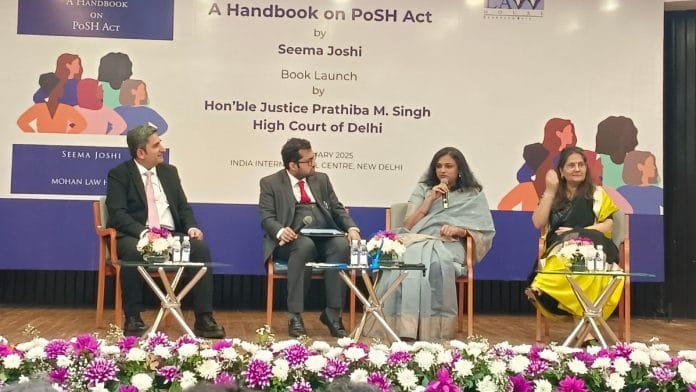New Delhi: Advocate Seema Joshi wants people to talk about workplace sexual harassment, simplify the legalities, and empower organisations and individuals. Her new book, Breaking the Silence: A Handbook on PoSH Act, aims to bring these conversations to the forefront.
As a practicing lawyer, Joshi has a front-row seat of the core challenges and progress in implementing the Sexual Harassment of Women at Workplace (Prevention, Prohibition, and Redressal) Act, 2013.
“Sexual harassment in the workplace is not just a legal issue; it is also a societal issue that affects productivity and the mental well-being of workplace culture,” said Joshi, at the launch of her book at Delhi’s India International Centre on 14 February.
The book was launched by Prathiba Maninder Singh, a sitting judge of the Delhi High Court. The panelists included Priya Mehra, Chief of Governance & Strategic Acquisitions at Akasa Air, senior intellectual property lawyer Swathi Sukumar, and advocate Jayant Bakshi.
One of the key points discussed at the event was the need to break the silence surrounding workplace harassment and ensure the complete implementation of the PoSH Act. While the legal framework is in place—like with any law—its efficacy is dependent on enforcement.
“My aim in writing this book is to bridge gaps, simplify legal complexities, and empower organisations, individuals, and legal practitioners with a comprehensive understanding of the law and its implementation,” said Joshi.
‘Made a difference’
There are times when workplace sexual harassment can be a minefield of misunderstandings.
“Ninety-eight per cent of cases stem from misunderstandings. Someone says something, and someone else reacts wrongly. It’s very easy to actually resolve these through conciliation,” said Justice Singh.
But misunderstandings are just one aspect of sexual harassment. More often than not, employees who have faced this are not even aware of their rights, legal recourse or the fact that every company should have an Internal Complaints Committee (ICC) to look into these complaints.
During the panel discussion following the launch, guests spoke about the legal foundation of the PoSH Act, the challenges in its implementation, effectiveness, and awareness. Questions around training, internal committees, under-reporting, retaliation, and false complaints also came up during the conversations.
Justice Singh called for more flexibility in the way the ICC functions, explaining that the requirement of multiple members in the committee—a presiding officer, two employees, a member from an NGO—can cause delay in the redressal of complaints.
She also pointed out that the functioning of the ICC can be simplified by holding informal meetings to gather information first, before going for a detailed investigation. This would help the committee work faster and more effectively.
“Sometimes, it took 8 or 9 years to conclude ICC proceedings, so there needs to be more flexibility in how the ICC functions,” she said.
After the PoSH Act came into force in 2013, women remained unaware of it for years. This, Justice Singh said, reflects in the number of PoSH cases filed in the initial years—just 161 in 2013-14.
The number, however, kept growing over the years, with 1,160 cases of sexual harassment at workplace reported in 2022-23 across just 81 companies.
“Does this mean there is more sexual harassment? No. It simply means there is greater awareness and sensitisation. Women are coming forward now, and that’s what it means. And therein lies the answer: the law has made a difference,” she said.
Also read: Who is raising Indian children? Wokeism, UN & Americans, says this panel
Gender neutrality
While the law has made significant strides, the general consensus among the panellists was that it’s not enough. More remains to be done to ensure the safety and dignity of women at work, said Joshi.
In her book, she not only offers a legal analysis of the PoSH Act but also includes crucial case studies and landmark judgments that have shaped its implementation.
While discussing some of the case studies, the panellists also touched upon the issue of false complaints of sexual harassment. According to Jayant Bakshi, the number of such cases is negligible and they are usually a result of exaggeration.
“There are a lot of people who don’t report cases and out of those who do, 99.5% are genuine, with only 1% or 1.5% being false,” said Bakshi.
Another important point of discussion was the need to reconsider the gendered nature of the PoSH Act. While the law primarily addresses the harassment of women, there is growing recognition that men too can be victims of harassment.
Bakshi and Sukumar suggested revisiting the provisions to make them gender-neutral, ensuring that both men and women can file complaints if they feel harassed.
“Gender-neutral policies are important because I believe it’s crucial for all colleagues to feel that they are treated equally,” said Priya Mehra.
(Edited by Aamaan Alam Khan)






